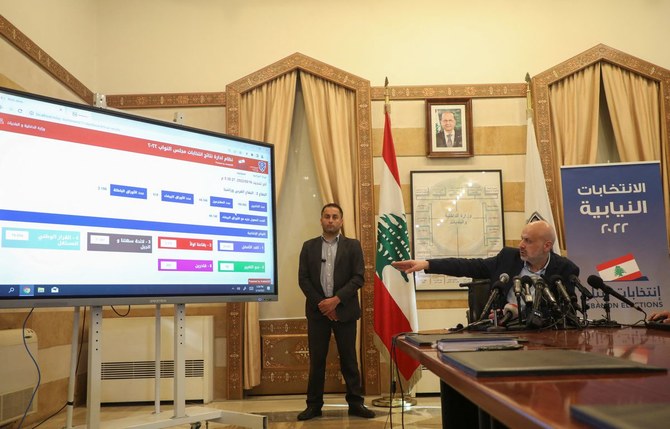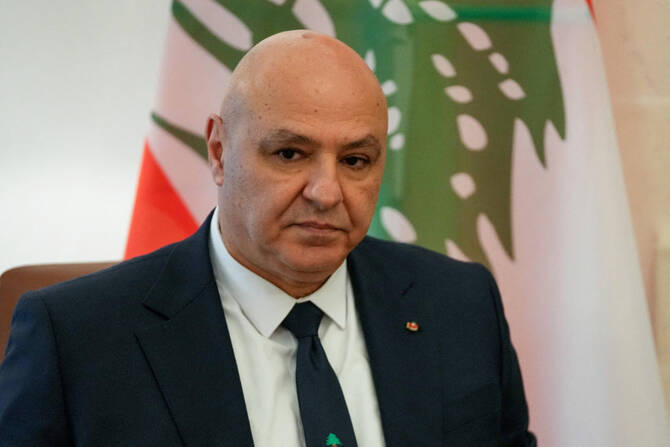Najia Houssari
BEIRUT: Lebanon’s militant Hezbollah group and its allies lost their parliamentary majority while independents achieved surprise breakthroughs, final elections results showed Tuesday.
The results indicate a fragmented and polarized parliament divided between pro- and anti-Hezbollah lawmakers who will likely find it difficult to work together.
The outcome signaled a shift in a country devastated by an ongoing financial crisis and soaring poverty.
New reformist faces who entered the legislative race on the values of a 2019 anti-establishment uprising made a stronger showing than many had predicted.
Saudi Ambassador to Lebanon Waleed Al-Bukhari tweeted that the result “proves the inevitability that the logic of the state will win against the absurd excesses of the statelet disrupting political life and stability in Lebanon.”
In the words of a political observer, “neither Hezbollah nor the Free Patriotic Movement is controlling parliament.”
On May 22, the term of the new parliament begins and Prime Minister Najib Mikati’s Cabinet will become a caretaker government.
The new house is expected to elect a new speaker amid the absence of parliamentary consensus to reelect standing speaker Nabih Berri, who has held the position since 1992.
Beirut witnessed on Tuesday morning the burning of a “Revolution Fist” that was set up in the Martyrs’ Square as a symbol of popular protest against the ruling class.
Moreover, the exchange rate of the US dollar against the Lebanese pound on the black market surpassed 30,000 Lebanese pounds for the first time after the elections.
The presidential palace announced that President Michel Aoun was transferred to Hotel-Dieu de France hospital in Beirut “to undergo some medical tests and X-rays.” They reassured the public that Aoun “will leave the hospital in the next few hours when the tests are done.”
The elected parliament does not resemble any of the six previously elected parliaments since the Taif Agreement in 1989. According to political observers, “it reflects the political turmoil the country is going through.”
The loss of several veteran political figures was remarkable in the election. Minister of Information Ziad Makkari said that those forces and figures “should reconsider the work they’ve done for their people.”
He added: “We hope that the forces of change that have reached the parliament seriously contribute to the rise of the country because it can’t endure any longer.”
Remarkably, Hezbollah and its allies won a total of 59 seats out of 128. The group’s allies include the Amal Movement, the Free Patriotic Movement, the Tachnag party and Al-Ahbash Association, along with Jihad Al-Samad, Farid Al-Khazen and Hassan Mourad.
The Amal Movement, headed by Nabih Berri, won 15 Shiite seats, most of which are occupied by current deputies, including two who were charged in the Beirut port explosion case.
Hezbollah won 13 Shiite seats, including current deputies and two new ones.
One Shiite and two Sunni deputies allied with Hezbollah also won.
The Lebanese Forces won 20 seats, including one Sunni deputy who was running on a list supported by the party.
The Free Patriotic Movement won 18 seats.
The Progressive Socialist Party, headed by Walid Jumblatt, won nine seats.
The Lebanese Phalangist Party won five seats, including an Armenian deputy.
The Independence Movement won two seats.
The Marada Movement won two seats, while Al-Ahbash won two seats — one in Beirut and one in Tripoli.
The Islamic Group won one seat.
Camille Dory Chamoun from the National Liberal Party won one seat. The party announced on Tuesday that “they will be part of the bloc that includes the Lebanese Forces and their allies.”
The elections also witnessed the victories — mostly in the north — of six former members of the Future Movement who left the party following former Prime Minister Saad Hariri’s decision to suspend his political activity.
Eleven independent candidates won, including some fiercely opposed to Hezbollah, such as Achraf Rifi in Tripoli and Fouad Makhzoumi in Beirut.
Fifteen deputies from civil society and the 2019 revolution won, including doctors, engineers, scientists, lawyers, businessmen and academicians. Their victory breaks the monopoly of the conventional political parties and reflects voters’ revolt against their traditional leaders.
The winners include Rami Fanj, candidate for the Sunni seat in Tripoli. He ousted deputy Faisal Karami, who comes from a veteran political family.
Eight out of 155 women candidates were able to break the parliament’s overwhelming male dominance.
Three of these female winners were already deputies, including Inaya Ezzedine from the Amal Movement, Paula Yaacoubian, who resigned amid the 17 October revolution, and Sethrida Geagea of the Lebanese Forces.
The remaining women deputies are Nada Boustani, former minister of energy affiliated with the Free Patriotic Movement, Ghada Ayoub from the Lebanese Forces and Cynthia Zarazir, Najat Saliba and Halima Kaakour from the civil society movement.






















